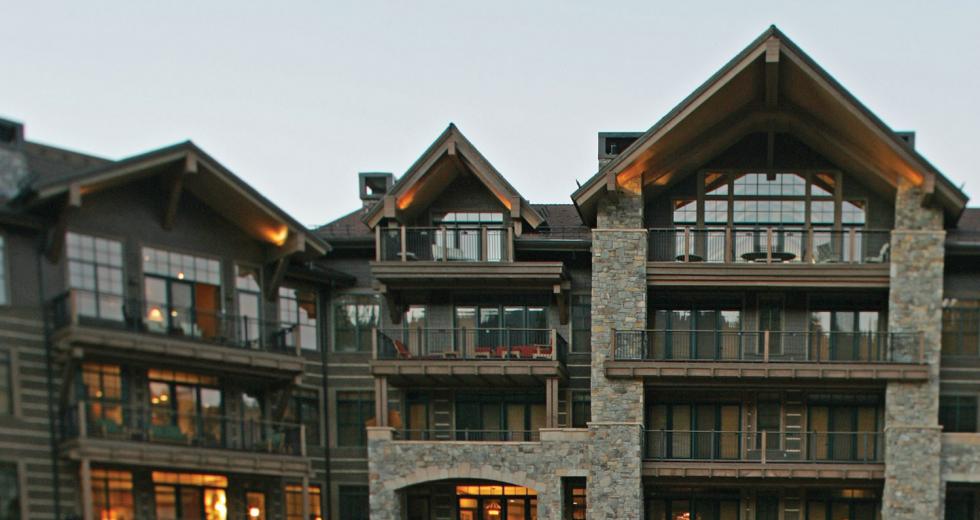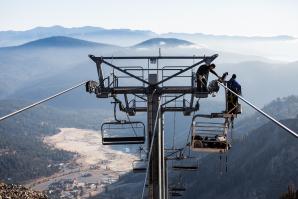Spring weather has graced area ski resorts with abundance, dumping generous volumes of snow on the slopes for giddy guests.
The resorts are pleased, but a couple of Placer County’s major ski destinations are even more enthusiastic about a different kind of windfall. They’ve recently been acquired by two of the nation’s well-known resort-management firms with plans to invest in the properties — heavily.
KSL Capital Partners LLC purchased Squaw Valley USA in December, and Northstar-at-Tahoe joined the Vail Resorts fold in October.
Resort representatives say the acquisitions could mean great things for the properties and the regional economy.
“It’s a huge tipping point for Northstar,” says Bill Rock, the resort’s chief operating officer. He cites Vail Resorts’ size and wealth of experience. It owns Heavenly Ski Resort in South Lake Tahoe, along with four popular ski destinations in Colorado, and served more than 5.8 million skiers and snowboarders in the 2009 season.
Vail Resorts acquired the stock of the companies that operate Northstar from Booth Creek Resort Properties LLC and other sellers for $63 million. Booth Creek also operates Sierra-at-Tahoe, but it was not part of the purchase.
Northstar is off Highway 267 just southeast of Truckee on land owned by CNL Lifestyle Properties Inc., which will lease to Vail Resorts under a long-term agreement.
Among the first changes was the hiring of Rock in December. With 14 years of experience in the mountain resort industry in locales such as Colorado, Vermont and New York, Rock most recently headed Intrawest’s Snowshoe Mountain Ski Resort in West Virginia.
He says he feels like he’s landed in the best place yet.
“Before the acquisition, Northstar went from being ranked 30th in a Ski Magazine poll to being in the top 15 in the nation, so it’s really clear that Northstar is a resort on the rise. Now with Vail’s acquisition, the plan is to ramp it up even more,” Rock says.
Northstar accommodated 700,000 skier visits last year. It currently has 19 lifts, 93 ski trails spread across 3,000 acres, seven terrain parks and snow sports including alpine and telemark skiing, snowboarding, cross-country skiing, snowshoeing and tubing. Summer activities include mountain biking, golfing, scenic lift rides for sightseeing and hiking, fly-fishing and more.
It hosts a new base village featuring 35 shops and restaurants in more than 100,000 square feet of retail space, a conference center, a 9,000-square-foot skating rink, on-site lodging and special events.
In March, Vail Resorts announced its plans to spend $30 million on major capital improvement projects at Northstar. Plans include the installation of a new high-speed chairlift that will service expanded additional ski trails, increasing the skiable terrain by 10 percent, construction of a new 500-seat on-mountain restaurant, and new national retail outlets and a signature restaurant in the Village at Northstar.
So far, there has been one tangible sign of new ownership.
“One of the advantages that guests saw right away is being able to ski both Northstar and Heavenly with one season pass,” Rock says.
During the peak of the season, Northstar-at-Tahoe Resort employs about 1,900 people, and that number likely will increase in the near future as projects get under way.
“Before the acquisition, Northstar went from being ranked 30th in a Ski Magazine poll to the top 15 in the nation, so it’s really clear that Northstar is a resort on the rise.”
Bill Rock, chief operating officer, Northstar-at-Tahoe
“Any time you invest, it has a benefit on the overall regional economy,” Rock says. “There’s going to be people who get work out of those projects, for sure, or who would have had a seasonal job and it goes year-round.”
A similar story is playing out at Squaw Valley USA. On Dec. 6, KSL Capital Partners, purchased the shares of The Squaw Valley Development Co., which includes all facets of the ski operations, the Village at Squaw Valley and related real estate holdings.
Founded in 1949 by Alexander Cushing, Squaw Valley is known worldwide for hosting the 1960 Olympic Winter Games. With 33 lifts and 4,000 skiable acres, Squaw Valley spans six peaks of the Sierra Nevada Mountains off Highway 89, between Truckee and Tahoe City.
KSL has committed to investing $50 million in the ski resort and surrounding village in the next three to five years. “That doesn’t include real estate, so if it were to bring in a hotel, that would be on top of that sum,” says Amelia Richmond, Squaw Valley public relations representative.
“KSL is a private equity company and only deals with travel and leisure properties, which means they have a really thorough understanding of what a traveler is looking for in the resort experience,” Richmond says.
KSL is the world’s largest owner of private golf and business clubs and has invested in numerous resorts throughout the country, among them California’s La Costa Resort and Spa, Hotel del Coronado, the Claremont Hotel Club & Spa and the San Francisco Bay Club, as well as ClubCorp.
Squaw Valley President and CEO Andy Wirth will continue in his role. He was appointed in August after having executive positions with Intrawest, based out of Vancouver, British Columbia, and Steamboat, Colo.
For this season, Squaw Valley already has undertaken more than $5 million in capital improvements. Now it’s faced with the enjoyable challenge of deciding how to spend the new owners’ pledge of 10 times that amount.
“We’ve reached out to three of the biggest resort planning agencies in the world,” Richmond says, citing â?¨Vancouver-based Ecosign Mountain Planners Ltd.; International Alpine Design of Avon, Colo.; and the Salt Lake City-based SE Group.
“These are companies that worked on Whistler, Sochi (Russia) and Rocha (Uruguay) and with Olympic planning companies,” Richmond says.
Squaw Valley officials call it a “bake-off;” the resort asked the three companies how they would spend â?¨the $50 million.
“We will be picking, based on their pitches, which company we’ll be moving forward with,” Richmond says, adding that it doesn’t mean Squaw Valley will necessarily use all the ideas of the chosen company.
“By the end of summer, we should have a better sense of our plans for the next three to five years,” she says.
In addition to the mountain upgrade, KSL is also exploring road improvements and options for real estate development near the resort’s base since the 9,200 condo and hotel units within a 20-minute drive have been deemed insufficient.
Together with Vail Resorts’ Heavenly and Northstar, a recharged Squaw Valley could draw more midweek â?¨visitors from around the country, rather than just the typical weekenders driving in from Northern â?¨California communities.
“More traffic going through there Monday through Thursday definitely would benefit local restaurants and other similar businesses,” Richmond says.
Recommended For You

Dirty Money
Endurance events bring serious cash to local economies
When towns host competitive endurance events with names like Ironman, Spartan Beast and Tough Mudder, you can expect that contestants will leave plenty of footprints. They’ll also leave a lot of money, sometimes millions of dollars.




